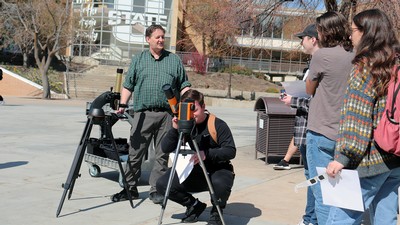Gender Bias 'Molehills' Build Over Time Into Mountains
By Diana Maxfield, from the Hard News Café
November 2, 2005 | Men and women may begin their careers on the same standing, but women tend to be advanced at a slower rate, according to the keynote speaker at the Utah State University Diversity Awards presentation.
Virginia Valian is a cognitive scientist whose research concerns gender differences and equality. She spoke to a crowd of about 50 USU faculty, staff and students at the 12th Annual Diversity Awards Tuesday.
"Men and women don't get the same credit for equal credentials," she said. "This is true in every field, except perhaps sopranos who sing in the opera."
Unequal advancement doesn't happen intentionally, and some may say it's not a big deal, Valian said, but it results in an accumulation of advantage for men.
"Mountains are molehills piled one on top of another," she said. "A very small amount of bias repeatedly encountered puts you at a disadvantage."
Valian cited several recent studies which show that women are perceived differently than men. A factor that may put men at an advantage can actually be a disadvantage to women. In addition, in studies which feature men and women of identical qualifications, women are seen as either less competent or less likable than men, depending on the situation, Valian said.
Everyone has schemas in their minds that allow us to make predictions about how a certain person will act, Valian said. These schemas, she said, can be a good thing: they help us adjust our behavior and know how to act in social situations. However, these schemas tend to include a fairly rigid view on the way men and women are. These schemas unconsciously affect the way we view women in the workplace, Valian said.
"Knowledge about gender differences comes into play," she said. This means that men and women are looked at differently even when it is unintentional.
Even in faculty evaluations at universities, she said, undergraduate students tend to rate male professors higher than female professors. Since these evaluations are considered by those who award tenure and promotions, this can have a detrimental effect on advancement of women. Female professors are also more likely to get inappropriate comments, such as "snazzy dresser," or "nice legs," reflecting the different way that women are viewed by society as a whole.
Letters of recommendation written by faculty members, Valian said, reflect similar trends; letters written for male students tend to be longer and contain more stand out adjectives such as outstanding or stellar, while letters for female students included more doubt-raising phrases or hard worker adjectives, which suggest that the student works hard because they have to, not that they are brilliant students, she said.
The end result of such unintentional biases, she said, is that men may get more credit for accomplishments and ideas, meaning they pick up advantages more often.
Comments and questions regarding this article may be directed to the contact person listed on this page.





